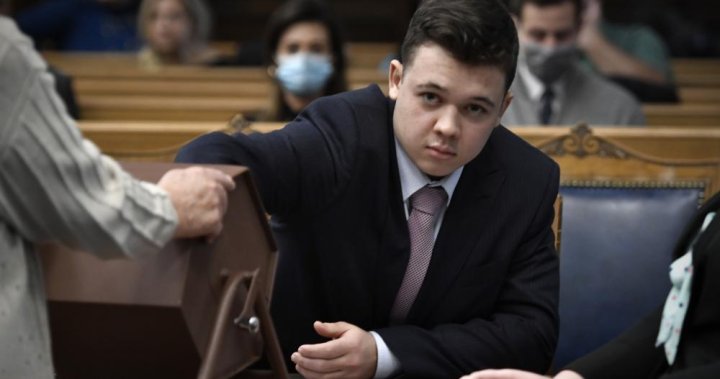
Kyle Rittenhouse: Jurors deliberate for 2nd day in murder trial
Global News
Kyle Rittenhouse, now 18, testified he acted in self-defense in Kenosha, while prosecutors argued he provoked the violence.
Jurors weighing charges against Kyle Rittenhouse were to return Wednesday for a second day of deliberations in his murder trial, after they failed to reach a swift verdict on whether he was the instigator in a night of bloodshed in Kenosha or a concerned citizen who came under attack while trying to protect property.
The jury of 12 deliberated for a full day Tuesday without reaching a decision. Several appeared tired as they walked into the courtroom Tuesday evening and indicated with a show of hands that they were ready to go home.
The case went to the anonymous jury after Judge Bruce Schroeder, in an unusual move, allowed Rittenhouse himself to play a minor role in selecting the final panel of 12 who would decide his fate. Rittenhouse reached into a raffle drum and drew numbered slips that determined which of the 18 jurors who sat through the case would deliberate and which ones would be dismissed as alternates.
That task is usually performed by a court clerk, not the defendant. Schroeder said he has been having defendants do it for “I’m going to say 20 years, at least.”
Rittenhouse, 18, faces life in prison if convicted on the most serious charge for using an AR-style semi-automatic rifle to kill two men and wound a third during a night of protests against racial injustice in Kenosha in the summer of 2020. The former police youth cadet is white, as were those he shot.
Rittenhouse testified he acted in self-defense, while prosecutors argued he provoked the violence. The case has become a flashpoint in the U.S. debate over guns, racial-justice protests, vigilantism and law and order.
The jury appeared to be overwhelmingly white. Prospective jurors were not asked to identify their race during the selection process, and the court did not provide a racial breakdown.
As the jury deliberated, dozens of protesters — some for Rittenhouse, some against — stood outside the courthouse. Some talked quietly with those on the other side, while others shouted insults. One woman could be heard repeatedly calling some Rittenhouse supporters “white supremacists.”





















 Run 3 Space | Play Space Running Game
Run 3 Space | Play Space Running Game Traffic Jam 3D | Online Racing Game
Traffic Jam 3D | Online Racing Game Duck Hunt | Play Old Classic Game
Duck Hunt | Play Old Classic Game











